Regional and local elections in Greece, 8 October 2023

Myrto Tsakatika
Professor of Comparative Politics at the University of GlasgowIssue
Issue #4Auteurs
Myrto Tsakatika
Issue 4, January 2024
Elections in Europe: 2023
The context
The Greek regional and municipal elections were held over two rounds on 8th and 15th October 2023. Regional and municipal elections for a fixed five-year term were held simultaneously in 13 regions and 332 municipalities. The 2023 elections were held under different rules than the previous election in 2019. In 2019 the electoral system used proportional representation to select the members of local and regional councils based on 1st round results, while mayors and regional presidents were elected only after securing 50% of the vote plus one. In 2022 the electoral law was changed in a less proportional direction. According to the new law, the regional and local leaders need to secure at least 43% of the vote to be elected in the first round, with the winning list being guaranteed a majority of 3/5s of seats in the local or regional council. The law also introduced a 3% threshold that any list has to surpass in order to obtain seats. The reform was meant to strengthen the influence of regional and local leaders and ensure ‘governability’ (Hlepas and Chadjipadelis, 2022).
The regional and municipal elections of October 2023 were the sixth Greek electoral contest in a row won by centre-right New Democracy (ND) after the 2019 European, national and municipal/regional elections and the two national elections of May and June 2023. In the June 2023 national election ND won 40,6% of the vote (up from 39.85% in the July 2019 national elections) and formed a single-party government. The Coalition of the Radical Left (SYRIZA), the largest opposition party since 2019, experienced steep electoral decline (from 31.5% in 2019 down to 17.9%), while centre-left PASOK/KINAL made modest gains (11.8% up to from 8% in 2019). SYRIZA and PASOK had been unable to establish a national-level electoral coalition, largely because of the high levels of volatility among centre-left voters which pitted the two parties against each other as direct competitors. Insofar as a realistic government alternative to ND is not in sight, meaningful opposition is weak, which raises concerns for Greek democracy (Tsirbas 2024). The Communist Party of Greece (KKE) (7.7%) and the three far-right parties Nike (3.7%), Spartiates (4,7%) and Elliniki Lysi (4.4%) improved their performance without posing a threat to the three major parties. Hence, at least since June 2023, Greece’s long standing two-party system seems to have been replaced by a dominant party system with New Democracy as its central protagonist (Tsirbas, 2024). It was widely expected that the 2023 regional and municipal elections would confirm these broad political trends due to their being held shortly after the latest national ballot.
Nonetheless, it is important to point out that there are key differences between regional/municipal and national elections in Greece. The first is that regional elections tend to be second-order elections, considered less important than national elections. Hence, in regional elections, both national and regional considerations are important for voter choice (Tsirbas, 2022). Municipal elections, on the other hand, are much more focused on local issues and parties officially take a back seat, with only a minority of cases where they officially endorse candidates (Hlepas and Chadjipandelis, 2022). The exception lies in the largest municipalities, particularly Athens, Thessaloniki and Pireaus, where political parties nominate candidates and contest the elections largely on national grounds. Finally, in terms of the territorial penetration of the main political parties, it is well known that New Democracy is the party best rooted at both regional and municipal level across the country, with PASOK also having considerable, but lesser, organisational capacity (Hlepas and Chadjipadelis, 2022). In contrast, SYRIZA’s presence ‘on the ground’ is scarce and its capacity to mobilise the vote locally and regionally is weak (Vernardakis, 2023). This is reflected in its generally much better performance in national elections compared to regional and municipal elections; on the contrary, ND tends to perform better in regional and municipal elections than in national elections. Finally, the Communist Party (KKE) retains a limited but consistent national presence at sub-national level, whereas the far right seems not to have achieved sufficient penetration and did not field candidates at regional level, which may have benefitted New Democracy or other independent rightist candidates.
The campaigns
On the back of the recent landslide win in the 2023 June parliamentary election in Greece, the PM Kyriakos Mitsotakis (ND, EPP) raised the stakes ahead of the regional and municipal elections, stating that the aim of New Democracy was to win all 13 regions and the three largest municipalities of Athens, Thessaloniki and Piraeus. He argued that the regions and large municipal governments needed to be ‘on the same wavelength’ as the national government in order to advance large projects that wouldboost economic and social development (Mitsotakis, 2023). In so doing, Mitsotakis heavily contributed to the nationalisation of the 2023 regional elections. He campaigned personally, travelling across the country to support candidates officially endorsed by New Democracy, such as Konstantinos Agorastos in Thessaly and Alceviades Stefanis in the North Aegean. In both of these regions, national-level events had posed challenges to the New Democracy candidates.
In the North Aegean region, the incumbent, Konstantinos Moutzouris, a right-wing independent who had not received official ND endorsement in 2019, had successfully instrumentalised the importance of the migration issue, of particular concern to the residents of the islands of Lesbos, Chios and Samos. Moutzouris sided with protesters when the government sent special police forces in February 2020 to enforce the building of new refugee reception camps. In October 2023, running for re-election against ND-endorsed Alceviades Stafanis, Moutzouris focused his campaign on that same issue. More prominently, in September 2023, less than a month before the regional elections, two major storms caused extensive damage in the Thessaly plain, Greece’s agricultural heartland. The floods that ensued claimed lives and devastated homes and livelihoods, livestock and arable land. The government response was deemed slow and substandard, while the regional governor, the until then popular ND incumbent Agorastos, was accused by the opposition of not having completed the vital infrastructural works that could have mitigated the damage. Climate change and the government’s efficiency in managing its consequences came to the forefront. Opposition candidate Couretas, supported by both PASOK and SYRIZA, was vocal against the incumbent and visited the sites of flooding, communicating directly with citizens in a way that Agorastos could not. The leaderships of SYRIZA and PASOK were also present, showing their support for the victims and the centre-left candidate.
In most regions, New Democracy-backed candidates faced a challenge not from candidates supported by the centre-left opposition, but rather, as was the case in the North Aegean, by independent right-wing candidates who did not enjoy the official endorsement of New Democracy. While most of these challengers did not have major ideological disagreements with New Democracy, they launched personal campaigns and built local alliances focusing on regional issues while criticising the central government’s alleged inefficiency. Some regional issues that disproportionately affect specific regions such as unemployment across the Western regions (to some extent due to the closure of lignite factories) or lack of healthcare and other vital infrastructure in the South Aegean and the Ionian Islands (Good Affairs, 2023) emerged in the regional campaigns.
At the local level, two high-stake contests for the national government were the elections in the municipalities of Athens and Thessaloniki. In Athens, Kostas Bakoyannis, the incumbent mayor, son of former Athens mayor Dora Bakoyanni and nephew to the current PM, was up for re-election. Bakoyannis was criticised by the PASOK and SYRIZA candidates for not doing enough to regulate the tourism industry in Athens or promote green space and, more importantly, for his incompetence in completing his own pet project, the Μεγάλος Περίπατος (Long Promenade), a ‘green’ pedestrian walkway that would develop along one of Athens’ major axes, Panepistimiou street. The costly project had taken much longer than expected to complete, disrupting the lives of Athenians and ultimately not delivering on the increase of green space. Polls were showing citizens’ disapproval of the project, but up until a few weeks before the municipal election a credible candidate able to challenge Bakoyannis did not emerge. PASOK’s candidate, the centrist Haris Doukas, was an academic whose professional expertise in urban crisis management helped him project an image of moderation, progressiveness and competence. The SYRIZA candidate, Kostas Zahariadis, nominated very late in the campaign, was an experienced but rather colourless party cadre, not well known by Athenians. After a notably successful televised debate against Bakoyannis, Doukas emerged as a credible challenger to the incumbent.
In Thessaloniki, New Democracy had strongly supported incumbent mayor Zervas, who had been elected largely on the wave of nationalist opposition to the Prespes agreement (Karyotakis, 2023) as a newcomer in 2019, but whose term was not considered successful by its completion in 2023. The independent candidate Stelios Angeloudis, whose political leanings were centre-left, was well entrenched in the city’s progressive politics and enjoyed the support of former PASOK Deputy PM Evangelos Venizelos, a politician with longstanding links to the area. Angeloudis ran as a progressive independent and — at least before the first round — did not enjoy the official support of both SYRIZA and PASOK, who fielded their own, joint candidate.
The results
Turnout in Greece, a country where voting is compulsory but the obligation is not actually enforced, was consistently above 70% in the democratic period until the national elections of May 2012. However, in 2012, with the first elections of the economic crisis period, turnout entered a downward spiral (Hlepas and Chadjipadelis, 2022). This trend was confirmed in the 2023 regional and municipal elections, which saw one of the lowest turnouts in the third Greek Republic. In the first round, turnout in the regional elections was 52.53%, compared to 58.28% in the 2019 election; in the second round, turnout dropped to 35.16%, compared to 41.88% in the 2019 election. For the municipal elections the picture was similar, with 52.50% down from 58.96% (in 2019) in the first round and 40.71% down from 44.83% (in 2019) in the second round. The municipality of Athens, in particular, had one of the lowest turnout rates in the country with 32.32% in the first round (46.76% in 2019) and a mere 26.73% (33.42%) in the second. These turnout results mirror long-term patterns in European democracies and medium-term patterns in Greece, but can also be partly attributed to election fatigue, given the proximity of the two national elections that preceded the regional and municipal elections.
| Turnout | 2010 | 2014 | 2019 | 2024 |
| 1st round | 60.88 | 61.56 | 58.28 | 52.51 |
| 2nd round | 46.68 | 61.61 | 41.88 | 35.16 |
The 2019 regional election had been a triumph for ND. The party had won 6 out of 13 regions in the first round and went on to win another 5 in the second round. Of the two remaining regions, one (N. Aegean) was won by an independent rightist with no ND backing and one (Crete) by a candidate supported by the centre-left. The first round of the 2023 regional elections seemed to indicate that ND was heading for a similar triumph, as New Democracy’s average score across the 13 regions reached 49.4%, a score much higher than the 41% it had secured in the recent national elections, but also considerably higher than the 43% it had achieved in the 2019 regional contest.
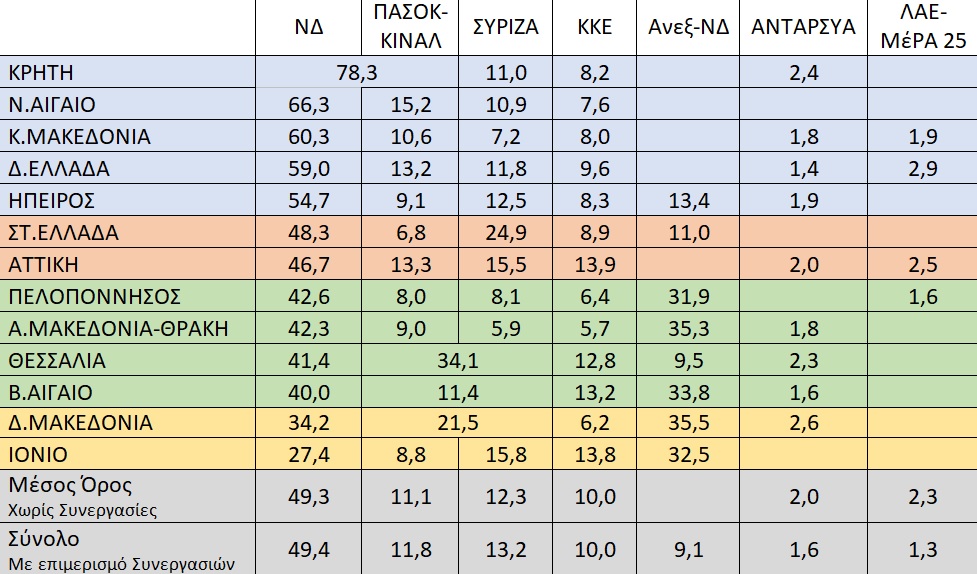
Figure b · Results of the 1st round, 2023
Indeed New Democracy secured the election of its candidates from the first round in 6 regions (South Aegean, Central Macedonia, Epirus, Western Greece, Central Greece and Attica) as well as the election of the candidate to which it had provided support in Crete, in collaboration with PASOK/KINAL. In another four regions (Peloponnese, East Macedonia & Thrace, North Aegean, Thessaly), the New Democracy candidate finished first but did not make it past the 43% threshold, which led to a second round being held. In the remaining two regions (West Macedonia and the Ionian Islands) the ND candidate came in second behind independent candidates with a New Democracy background.
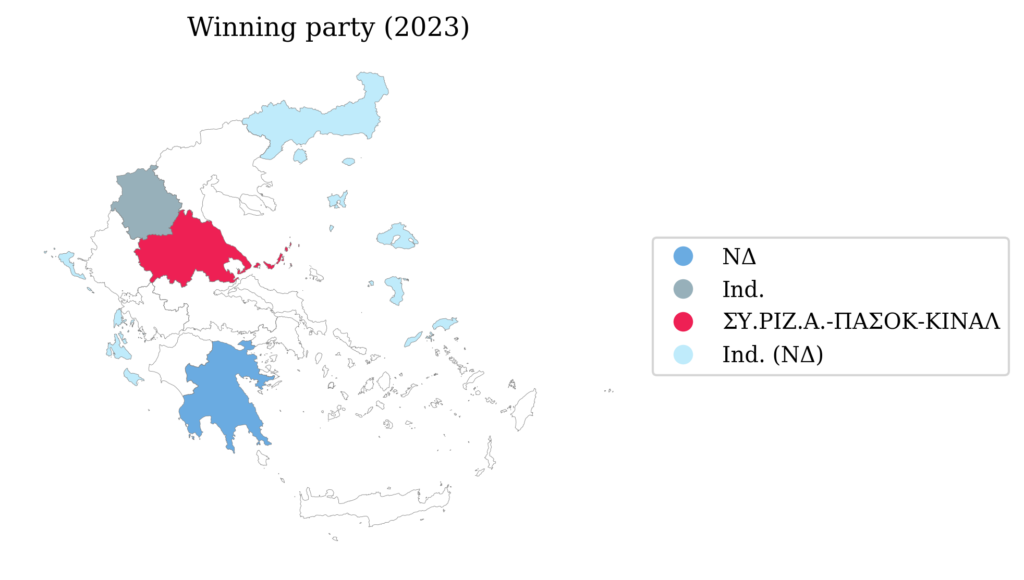
The second round, which was held in 6 of the 13 regions and 83 of the 332 municipalities, had some fairly unexpected negative outcomes in store for New Democracy. Despite its candidates being present in all regional run-offs, the party only won in the Peloponnese. New Democracy candidates lost to right-wing independents in four regions and to the centre-left candidate Couretas, backed by SYRIZA and PASOK, in Thessaly. Importantly, in the municipal elections, New Democracy lost Athens, where Doukas, backed by SYRIZA, defeated Bakoyannis. In Thessaloniki, Angeloudis made it to the second round, where he defeated the incumbent ND candidate Zervas thanks to the endorsement of both SYRIZA and PASOK. Both were symbolic defeats for New Democracy, where, as in Thessaly, a last minute alliance of progressives was able to overtake New Democracy candidates.
| 1st round | 2nd round | Athens (2019) | Athens (2023) | Thessaloniki (2019) | Thessaloniki (2023) |
| ND | 42.65 | 65.25 | 41.35 | 44.03 | 22.41 | 33.21 14.98 | 66.79 14.56 * | 27.34 | 32.67 |
| (PASOK-)KINAL | 13.19 | 14.19 | 55.97 | 7.07 | 20.74 ** |
| SYRIZA | 16.98 | 34.75 | 13.35 | 13.53 | – |
| KKE | 7.46 | 12.88 | 4.48 | 6.82 |
| XA | 10.54 | – | – | – |
| Spartiates | – | 8.33 | – | – |
| Ind. (Angeloudis) | – | 25.74 | 67.33 |
** with SYRIZA support
Figure d · Results of the municipal election in Athens and Thessaloniki
Conclusions
The 2023 regional and municipal elections confirmed the electoral dominance of New Democracy, the electoral demise of SYRIZA and the modest recovery of PASOK (Kathimerini, 2023). However, the Thessaly emergency, the campaigns in the regions won by independant right-wing candiates as well as the Athens and Thessaloniki mayoral campaigns turned the spotlight on the competence of the candidates supported by New Democracy. Since the PM had chosen to turn these elections into a national contest, these defeats were linked to, and reflected back on, the competence of the government. Moreover, the second round of the regional contests provided evidence for serious fault lines within the ranks of New Democracy, with right-wing candidates who had not secured official ND support challenging ND candidates and winning on several occasions. The message from the Thessaly region as well as from the municipal elections in Athens and Thessaloniki was that a united centre-left can challenge the dominance of New Democracy. This spells good news for Greek democracy but places a burden of responsibility on the centre-left opposition to find pathways towards co-operation.
The data
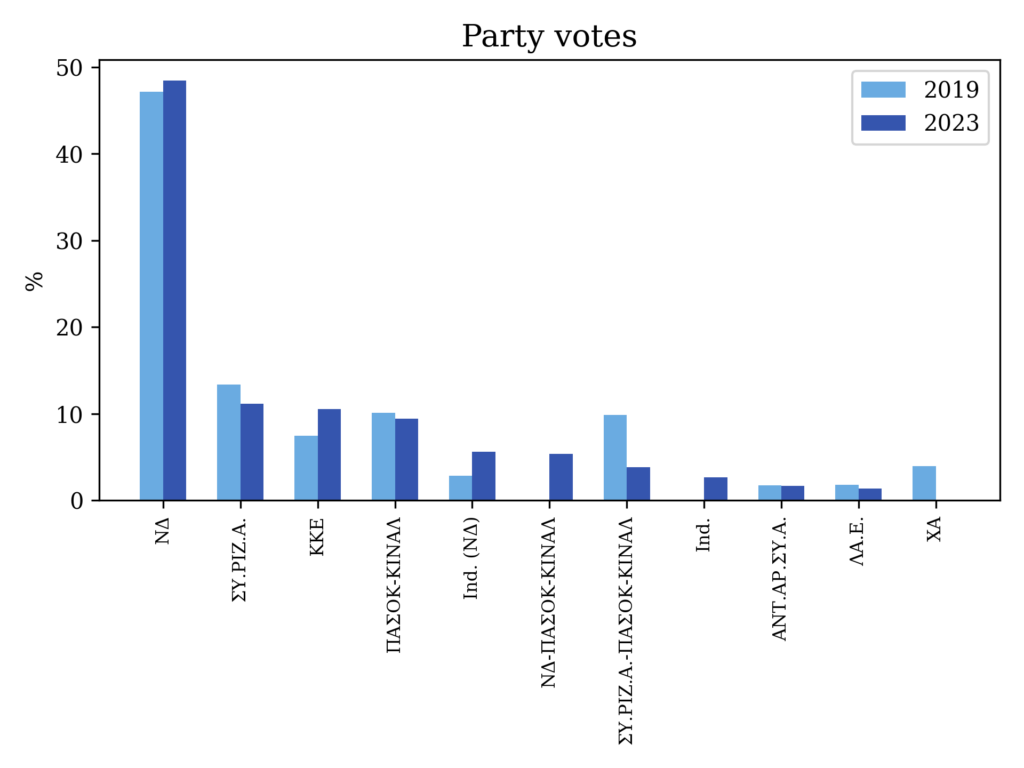
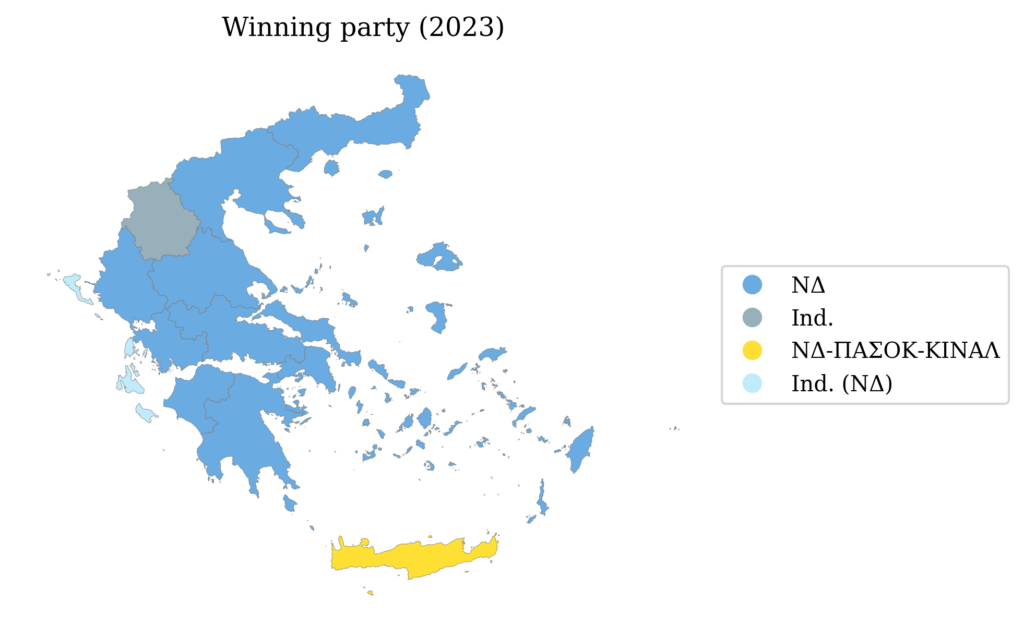
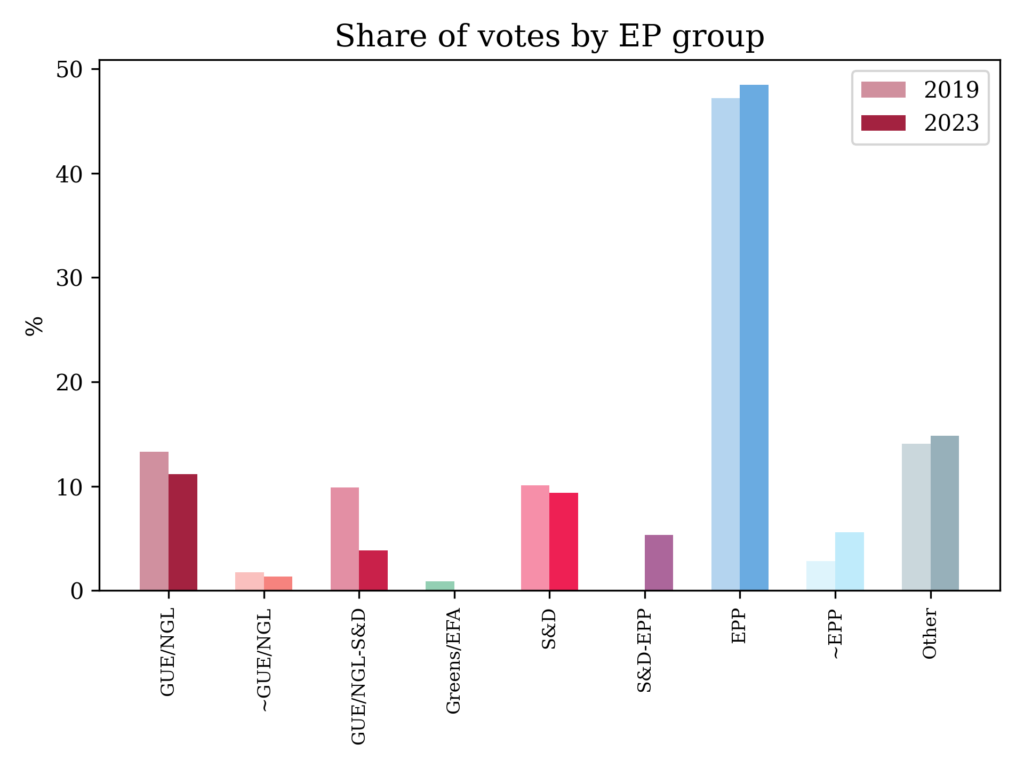
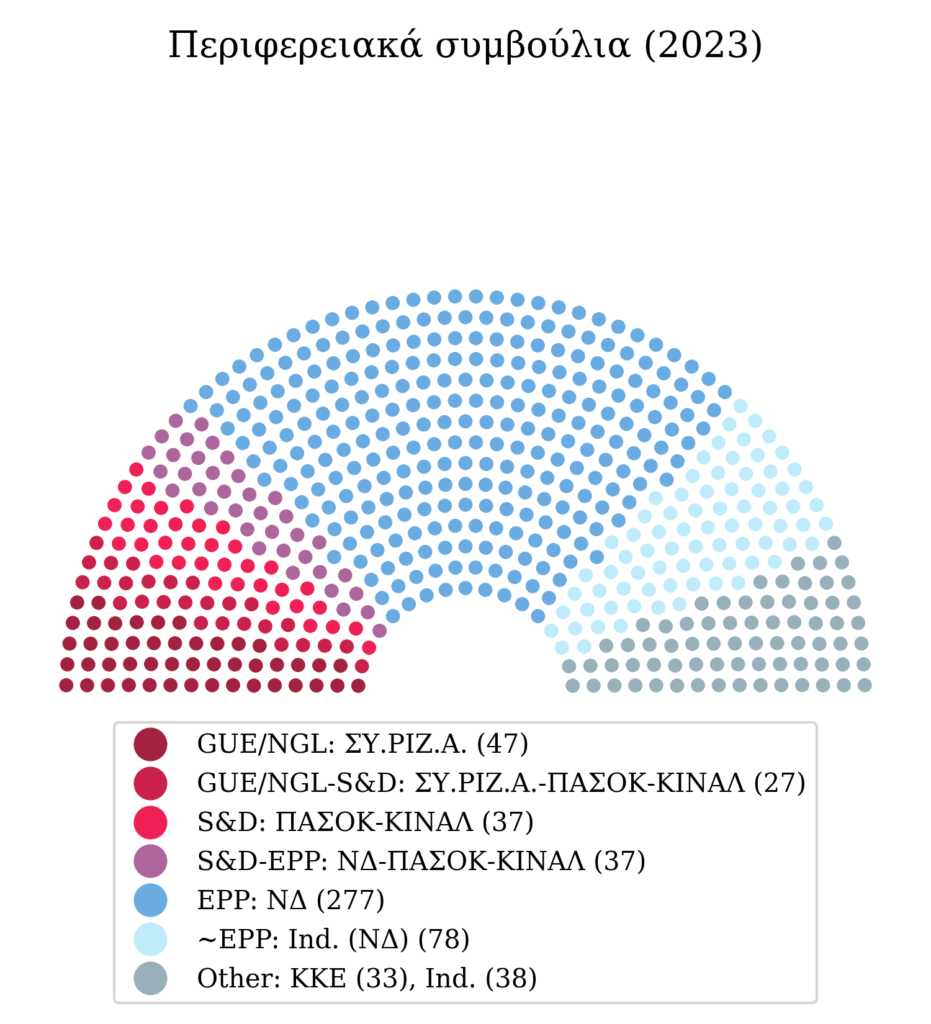
References
Antoniou, D. et al. (2023, 16 October 2023). Αυτοδιοικητικές εκλογές: Ο γύρος των μεγάλων ανατροπών. Καθημερινή.
Good Affairs Ι.Κ.Ε. (2023). Digital Poll on Regional Self-government, 19-26 April 2023. Good Affairs. Online.
Greek Ministry of the Interior (2023). Results of the 2019 and 2023 regional and municipal elections. Online.
Hlepas, N. & Chadjipadelis, T. (2022). Mayors in the foreground, parties behind the scenes’. In A. Gendźwiłł, U. Kjaer, & K. Steyvers (eds.), The Routledge Handbook of Local Elections and Voting in Europe. London: Routledge.
Karyotakis, M.A. (2023). The use of the Macedonian name dispute on the candidates’ websites in Northern Greece’s regional and municipal elections of 2019. Mediterranean Politics.
Koustenis, P. (2023, 14 October). Αυτοδιοικητικές εκλογές 2023: το χρώμα της κάλπης και η κυριαρχία σε καθεστώς αποχής. Το Βήμα.
Mitsotakis, K. (2023, 2 October) Interview with Antonis Sroiter, Alpha central news bulletin. Online.
Tsirbas, Y. (2022). The 2019 regional elections in Greece: Both regionalized and nationalized. Regional & Federal Studies, 32:4, 499-510.
Tsirbas, Y. (2024). Towards a predominant party system: the May 2023 election in Greece. South European Society and Politics.
Vernardakis, C. (2023, 23 October). Ο εύθραυστος ηγεμόνας (ΝΔ) και το μετέωρο βήμα της αντιπολίτευσης. Παρόν.
citer l'article
Myrto Tsakatika, Regional and local elections in Greece, 8 October 2023, Jun 2024,
à lire dans cette issue
voir toute la revue





